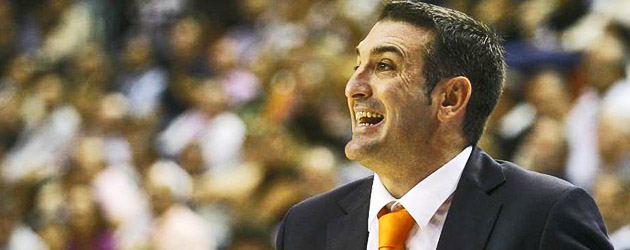But here there is very good potential, in these two months I have looked and I have liked what I’ve seen, and if people want this, in England there is good potential. At the moment the u-18 national team is playing in Division A, a few years ago this would be impossible, now I think basketball can be a good sport here.
RS: A lot of European coaches say they would love to have players with English kids’ athleticism, but they are behind in their understanding of the game. What are you trying to teach at Barking Abbey? Should kids be drilled into learning twenty different offences or should they learn, say, a few half court sets and then improvise? What’s your philosophy?
LG: For me, in general, the most important thing is for English players to learn to read basketball. They must learn to choose the best decision in each moment. That is the most important thing here. The players here have everything else, but they need this. When they must do different things, to put the ball into the low post, or not - what works is not the same with five minutes to go in the game, as at the start of the game. These decisions are the most important things to learn. People must work here to make progress with the players, they are good athletic, technical players but they need this, without it they cannot use their abilities to play basketball.
RS: So, take me through a typical day at Barking Abbey. You said a lot on what the players need to learn, are you working with individuals on these skills, or taking them as a team and running through sets?
LG: The first thing to say is I like very much the philosophy at the academy, there is nothing similar in Spain. Why? Because you study and play basketball. After 5, 6pm you go to study, you go home with your family, you relax. It’s very important to relax after hard work. For me, this is incredible.
 I start at 8:30am, here in the academy you have five individual sessions during the day. You can work two players, one player, four players. I can do three or four sessions, depending on the day, with the players. Each player has his own programme. It’s individual, it’s very important to progress, it’s not the same to work with point guards, with big men, if one player is not a good shooter, it’s an individual programme during the day. Then when this is finished, I work with the other coaches and we have a team session, for an hour, one hour thirty minutes.
I start at 8:30am, here in the academy you have five individual sessions during the day. You can work two players, one player, four players. I can do three or four sessions, depending on the day, with the players. Each player has his own programme. It’s individual, it’s very important to progress, it’s not the same to work with point guards, with big men, if one player is not a good shooter, it’s an individual programme during the day. Then when this is finished, I work with the other coaches and we have a team session, for an hour, one hour thirty minutes.
At the moment I work as an assistant coach to the coach here, I help him when he needs it, and I give my opinion on different things. This is a technical and tactical programme, and we have also a strength and conditioning coach, he was a professional player here [Duncan Ogilvie, former England international who played in France and Spain]. We also collaborate with the federation and they visit three or four times a year to evaluate the players physically. This is very important in basketball, a lot of players have problems with these things.
Here at Barking they control everything, technical, medical, physical, technical, tactical, all of this, which is very important. After each day is finished, I continue to learn English, which is my other goal in the time I am living here. On the weekends, we have games, the men have three leagues: under-18, under-19 and Division Four. Depending on the level of the league, some players play in all the games. It’s good, because you have different levels of the leagues, and different levels of players.
RS: We’ve seen the best young British players - Joel Freeland, Devon van Oostrum, Daniel Clark - they have all gone to Spain to develop their game, to become better players, to become pro players. Do you think that young players who aspire to play at the very highest level will continue to have to go abroad, or with the Barking Abbey programme, do you see a time when a 16, 17 year old player can stay in Britain, and then go on to play abroad? Or to get to that level, will our kids still have to go to the NCAA or Spain? What do you think?
 Posts
Posts
